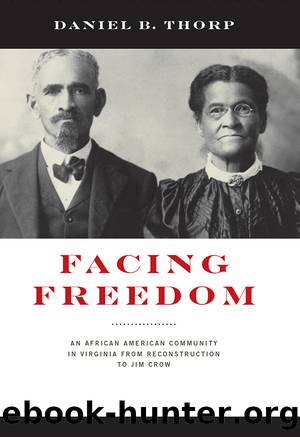Facing Freedom by Daniel B. Thorp

Author:Daniel B. Thorp [Thorp, Daniel B.]
Language: eng
Format: epub
ISBN: 9780813943572
Barnesnoble:
Publisher: University of Virginia Press
Published: 2019-07-30T00:00:00+00:00
5 TEMPLES BUILT UNTO THE LORD
RICHARD TAYLOR DIED in February 1879. By then, according to the local newspaper, he was one of the most respected preachers in Montgomery County. Taylor had been born about 1800, and he and his family had been slaves on the farm of George Earhart, east of Blacksburg, until the fall of the Confederacy set them free. âPious from early manhood,â Taylor had become a devout Methodist and by the 1830s was serving as a lay minister to his local African American community. In spite of a state law passed in 1832 that banned preaching by slaves or free people of color, Taylor continued to preach through the close of the antebellum era. The Messenger reported that he was âespecially eloquent in prayerâ and with the permission of his master and the consent of the white community had preached âwhere-ever he felt called to goââincluding the resort at Montgomery White Sulphur Springs. Following his emancipation, Taylor initially remained active in the Methodist Church, but according to Charles Schaeffer, he began to grow âmuch exercised in his mind on the subject of baptism.â As a result, in 1869, Taylor joined the Baptists and for the final decade of his life served as pastor of the African Baptist Church in Christiansburg.1
The experience of Richard Taylor was, in some ways, quite different from that of any other African American living in Montgomery County during the nineteenth century. He was among the small number of men in his dayâand perhaps the only black manâto warrant a newspaper obituary at his death, and his coffin was escorted to the cemetery by âone of the largest processions ever seen in this place [Christiansburg], composed of both colors.â Taylor was, the paper noted, âlistened to with profit by white and black alike.â In other regards, however, Richard Taylorâs experience typified those of other men and women of color in the county following the end of slavery. During and after Reconstruction, Taylor and other African Americans in Montgomery County moved out of the biracial religious communities in which they had participated before 1865 into a different and much more racially homogenous community. Martin Luther King famously described church services in the modern United States as âthe most segregated hour of Christian America,â and the Messenger notwithstanding, Richard Taylor helped to create that hour. In the years after the Civil War, he and other African Americans living in Montgomery County reoriented their spiritual lives and played a major role in the creation of distinctly black churches throughout the county, and these churches quickly took their place among the most important institutions in the countyâs African American community.2
Religion had been a key element in Montgomery Countyâs African American community long before the Civil War. Both slaves and free people of color had frequently attended church services and been members of churches in antebellum Montgomery County. Because fully autonomous black churches were illegal in Virginia at that time, however, most of the religious activity that can be documented before 1865 was in white-controlled churches.
Download
This site does not store any files on its server. We only index and link to content provided by other sites. Please contact the content providers to delete copyright contents if any and email us, we'll remove relevant links or contents immediately.
Warrior Queens & Quiet Revolutionaries by Kate Mosse(358)
A Rome of One's Own by Emma Southon(310)
Respectability and Reform by Tara M. McCarthy(306)
Executive Order No. 9066: The Terrible Injustice Of 1942 by Sollace Freeman(301)
The Evidence of Things Not Seen by James Baldwin(295)
The Explorers by Amanda Bellows(272)
A Wider Type of Freedom: How Struggles for Racial Justice Liberate Everyone by Daniel Martinez HoSang(247)
Letters From London by Julian Barnes(222)
Rethinking White Societies in Southern Africa by Duncan Money(217)
The Grey Eagles of Chippewa Falls by John E. Kinville(216)
The Crosswinds of Freedom by James MacGregor Burns(214)
Liberty's Dawn: A People's History of the Industrial Revolution by Emma Griffin(212)
A Troublemaker May Surprise (The Troublemaker Series Book 2) by Genta Sebastian(200)
Evolution of Slavery Through the Ages: A Comprehensive World History of Slavery by PRESS VERITY(198)
A Teacher's Guide to Ladies of Liberty by Cokie Roberts Amy Jurskis(185)
The Slave Ship, Memory and the Origin of Modernity by Martyn Hudson(178)
Continental Strangers by Gemunden Gerd;(175)
Beware the Masher by Kerry Segrave(165)
Hunger Dark Pen by Dark Pen(162)
